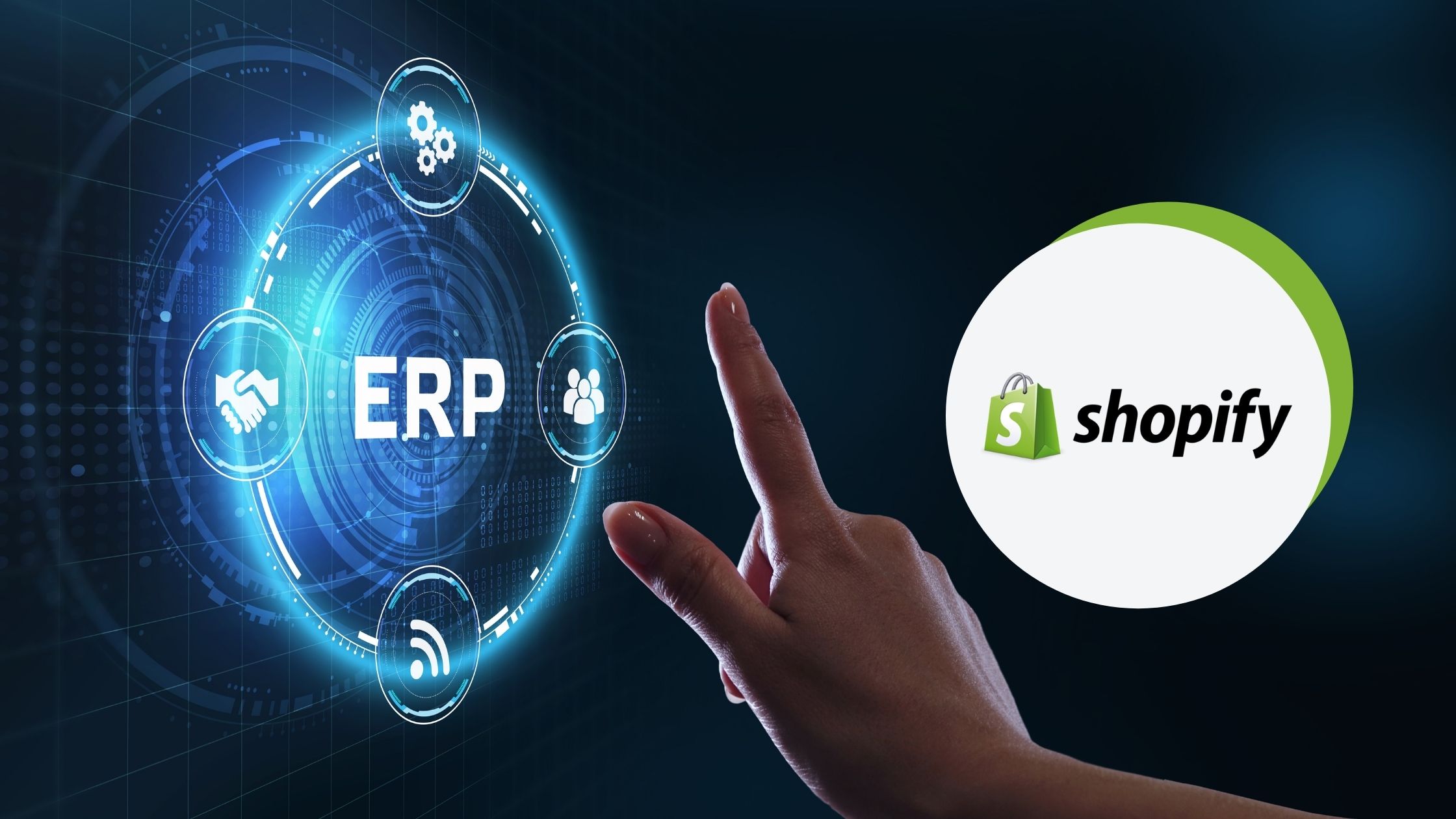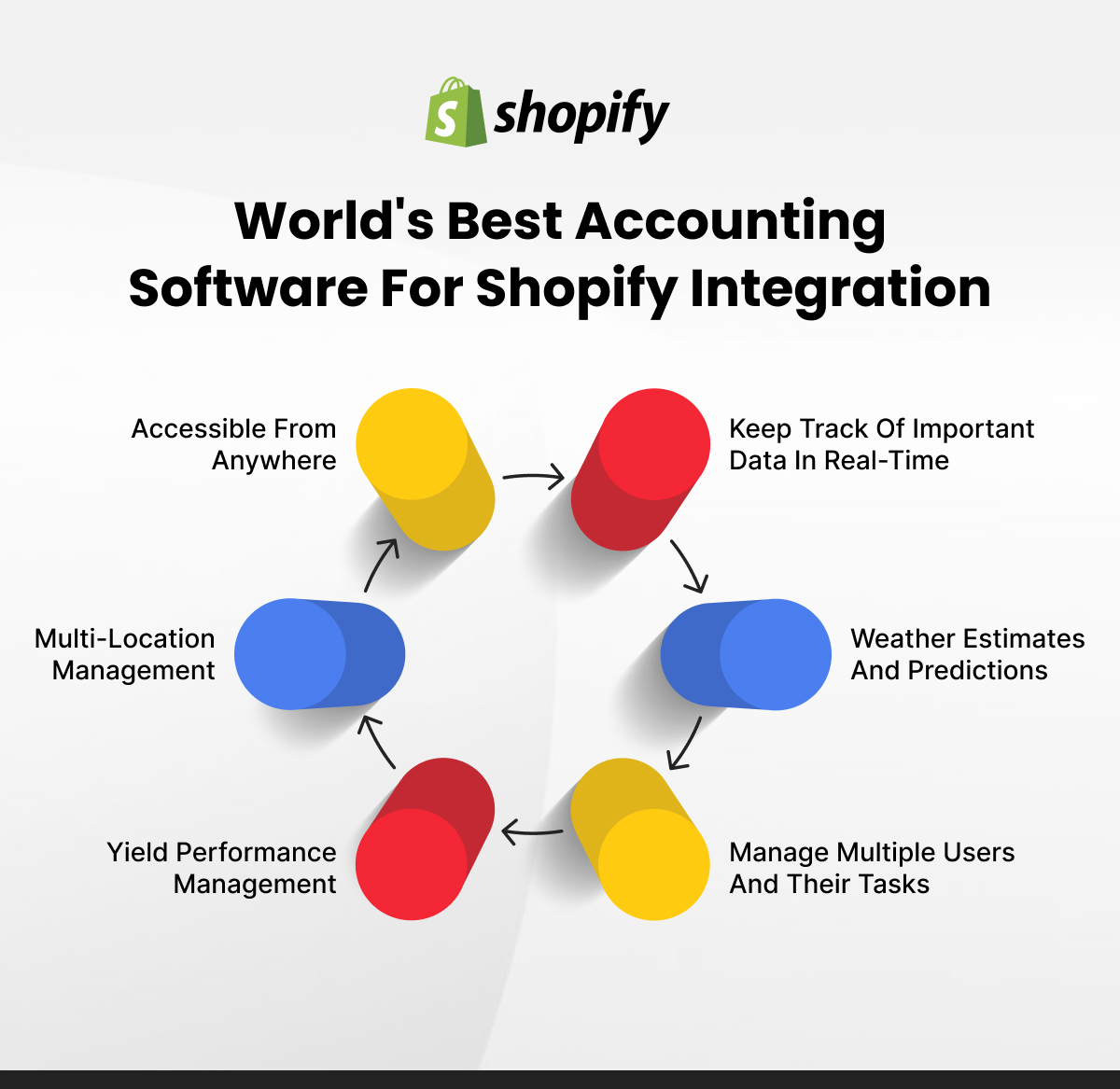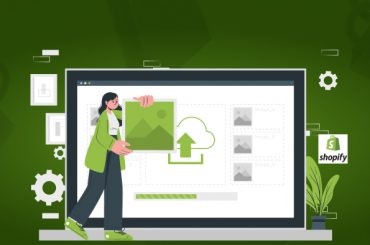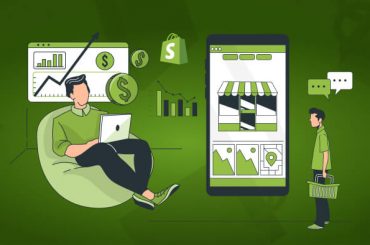Top ERP for Shopify – Choosing the best ERP for Shopify Store!
Last Updated | January 16, 2024
Table of Contents
ERP has become an essential technology for online brands and businesses specializing in retail and eCommerce. It’s a crucial tool for businesses involved in accounting, finance, the hospitality industry, healthcare centers, risk management, and various other industries. Not to forget, ERP has become a get-go and core option for online businesses. But again, the ERP solutions battleground has heated up, which means finding the right ERP for Shopify stores is challenging, but we are here to help.
So, let’s get into the details!
Overview: What Is ERP eCommerce?
ERP eCommerce has gained immense popularity and has experienced steady growth as online businesses keep flourishing. Integrating the eCommerce store with ERP software can improve productivity, increase revenues, and retain the customer base. There are pre-built integration functionalities available, along with add-ons and modules. It doesn’t matter if you are running a BC business, B2B business, or D2C business; growth is your ultimate priority.
However, various complexities have to be considered with business growth, for which companies generally use multiple software solutions to handle specific business functions. However, with ERP eCommerce, all business functions can be controlled through one unified platform, which promises a better process connection. In addition, the procedures can be connected to create cohesive and consistent business operations. With the correct implementation of ERP eCommerce, businesses can yield the following benefits;
- It helps centralize the sales information from various arenas (sales data consolidation). This will also provide efficient insight development, and the automated systems will streamline business processing while including the data points.
- It can improve the operational productivity of businesses since it connects different workflows and optimizes information exchange. Some ERP solutions also have the capacity to automate shipping and reconciliation. As a result, the business productivity will be enhanced, and more operations can be carried out.
- ERP solutions can help eCommerce businesses earn more profits by implementing automation and increasing productivity. The best thing about ERP eCommerce is that it raises revenue to a point where it outweighs the implementation costs.
- Different ERP solutions provide CRM features as an add-on that leverages customer data and leads to effective sales leads. In addition, it can automate shipment tracking and notification alerts that create a positive impression in front of the customers.
- ERP solutions allow the users to customize the dashboard that provides accurate and clear information about project status, finances, and resource allocation. In addition, they can provide insights through graphs and charts for quick decision-making and identification of sales opportunities.
When it comes down to ERP solutions, different vendors offer different features. However, some features more pertinent to eCommerce businesses to yield better outcomes includes;
- CRM – This is a customer relationship management feature that’s essential for eCommerce businesses. The CRM software helps increase leads and retain customers. In addition, it often offers an online help desk, on-time shipping alerts, and customized ads to ensure customers keep coming back to you.
- Finance – the accounting and financial management tools are essential for optimizing the financial data. The financial data will help businesses centralize the business processes and create financial forecasting models for improved reordering and forecasting the lead times.
- Inventory Management – If you sell business services and products through different channels, inventory management will help keep a record of available products and goods. It will ensure that inventory information is accurate, and having real-time data will provide quick decision-making.
- Distribution Or shipping – Various eCommerce businesses take part in dropshipping and having these features allows the eCommerce businesses to sell different products without hoarding the inventory.

What Is ERP For Shopify?
ERP stands for enterprise resource planning, and it’s an excellent option for Shopify store owners with complicated back-end office procedures and high-volume data to handle. ERP is connected with the Shopify shop to improve business handling. It’s a suitable choice if your Shopify store is growing and the order volume keeps increasing. However, if you are having a hard time accessing financial reports, ERPs will help.

With business growth, multiple stores struggle to fulfill orders and optimize the shipping time, but an ERP can help optimize the shipping according to order volume. It is an excellent option for managing numerous product suppliers at once and optimizing the B2B customer relationships (this management is challenging, but ERP helps). Not to forget, integrating ERP solutions with Shopify stores will eliminate manual tasks, leading to higher employee productivity.
Read Also Shopify vs NopCommerce
How To Connect Shopify To ERP?
Connecting the Shopify store with ERP depends on which ERP software solution you are using. However, you can rely on Folio3 Shopify design agency because Folio3 Shopify integration solutions are something you can trust. To put it simply, Folio3 has two following Shopify connectors available for a variety of ERP solutions, such as;
Folio3 Shopify Connection For Business Central, AX, And Dynamics 365
it can help automate the transactions and synchronize the data from Shopify stores to ERP without making it challenging. It can help automate inventory level updates, billing data, and shipping information. Moreover, it can automate the syncing of customers’ data, orders, and refunds. The best thing about this connector is the real-time synchronization of the product description, supporting multiple matrix items. Lastly, it offers support for order cancellations, refunds, and repetitive orders.
Folio3 Shopify Dynamics Navision Connector
It can be used for integrating Microsoft Dynamics and helps manage every business information and data in one place. It can seamlessly close gaps between online and offline processes to ease process management. To name a few, it can automate order syncing, customer data syncing, and syncing the billing data and inventory. In addition, it provides product data syncing.
In addition to these connectors, Folio3 Shopify website development services also help other ERP solutions with Shopify stores.
Read Also Shopify Stripe Integration
What ERP System Does Shopify Use?
Shopify doesn’t have a specific ERP system because it depends on your business needs and growth. That being said, ERP solutions are only integrated with Shopify and lead to the integration of internal business systems. In addition, it offers syncing of Shopify store inventory with the help of a database system. According to stats, eCommerce shops from around 175 countries choose Shopify for selling their products. However, with business growth, order fulfillment will be challenged, but ERP can help.
Read Also Best Accounting Software
Even more, with business growth, you will have complications in managing the suppliers and product catalogs. Since you have to keep track of inventory, manual processes will only make it harder. Consequently, it will increase the HR costs due to manual processes. With all these issues in mind, Shopify integration with ERP systems can streamline various business functions and yield better outcomes. Shopify-powered online stores tend to create extensive data that needs to be processed and organized (it’s time-consuming).
With the integration of Shopify and ERP, various business issues can be resolved. To begin with, it can help save costs and time by eliminating manual processes and reducing the workload. The best thing about ERP and Shopify integration is the increased efficiency of operations and minimized data entry errors. Secondly, the integration will help sync data, update the inventory, and promise optimized data transfer. Lastly, it eventually leads to increased revenues and profits.
Shopify ERP Partners – Who Is Shopify Partnering With?
Recently, the news surfaced that Google is partnering up with Shopify. This partnership with Shopify will allow the merchants to reach more customers through Google Search, and it will enable the store owners to sign up with a few clicks, and the products will start appearing in the Google results through Lens, search results, images, YouTube, and Maps. Currently, Google hasn’t provided many details about the integration. According to Google, the shopping graph also helps pull information from different reviews, websites, and reviews to deliver accurate information provision to online customers.
The shopping graph will span across different platforms of Google. However, before these systems start working, Google will need the customers to like shopping from Google. This is for the same reason why Google partnered up with Shopify. Not to forget, the stock increased by 3.52% for Google.
What Is Shopify ERP API?
Shopify API is basically a tool that empowers software providers to access data from different Shopify stores and make value-based decisions. It supports JSON, XML, and HTTP requests, such as put, post, delete, and get. The best thing about Shopify API is that it works fine with order, product, category, and customer methods. All these methods can be utilized for specific purposes. What’s best about Shopify API is the consistent updates.
However, Shopify store owners need to be aware of these constant updates to ensure the connections are reliable and consistent. For instance, Shopify replaced page-oriented pagination with cursor-oriented pagination.
Is Shopify Open Source eCommerce ERP?
First things first, Shopify is not an ERP. However, it can work with open-source eCommerce ERP, and this integration is convenient. That’s because there is no need for third-party integration, vendors, or point-to-point connectors. For those who don’t know, open-source ERP is ERP software with a public source code. These solutions are suitable for small-scale and medium-scale businesses. What’s best is that they don’t even need support fees or licensing fees.
What Is ERP Compatible Shopify?
ERP is a comprehensive solution that helps businesses optimize efficient and effective processes. It can automate the business processes. As far as compatibility is concerned, Shopify works fine with ERP solutions which we will discuss later in the article.
Which One Is The Best ERP To Integrate With Shopify?
-
Microsoft Dynamics
This cloud-based and modular ERP system provides multiple tools for project management, marketing, sales, project service, financial tracking, CRM, marketing automation, and sales forecasting. It has an advanced CRM and can be integrated with the sales navigator of LinkedIn and Microsoft solutions. Microsoft Dynamics empowers businesses to make data-based decisions that provide accurate forecasting and improve efficiency.
It’s a great ERP solution for non-profit and government businesses. It can integrate machine learning, virtual reality, and artificial intelligence tools. The best thing about Microsoft Dynamics is that it provides offline data synchronization, which eventually improves communication, reporting, and sales projections.
-
NetSuite
This is a cloud-based platform that covers various business processes, such as finance, eCommerce, manufacturing, and supply chain. It’s a suitable option for businesses of different sizes and provides ultimate control and visibility over business processes. It can automate business processes (back-end and front-end) while integrating data and visual stats. Access to this data will help make value-based and practical business decisions.
It’s needless to say NetSuite is one of the most popular and widely used ERP solutions. It has reporting and business intelligence features that empower businesses to make improved decisions. What we love about NetSuite is its scalability and consistency to expand the functionalities with business growth. It wouldn’t be wrong to say that NetSuite and Shopify integration promises better outcomes.
-
Odoo
This is an open-source ERP solution that has become a top choice for business experts and developers. Odoo provides a combination of inventory management, CRM, accounting, project management, billing, manufacturing, eCommerce, purchasing, warehouse management, and financial management. It has a high-end framework that allows the developers to access updates, and there are over thirty modules available for optimizing the business processes.
It has a modular configuration that allows customers to personalize their preferences and add multiple modules to enhance functionality. In addition, it has pre-built integration available for automating the workflows.
-
SAP
To begin with, this is one of the biggest and most widely implemented ERP solutions available, and more than four decades of experience empowers you to meet your unique demands. With SAP, the clients can manage the organization, and higher scalability promises seamless implementation. For instance, it can be implemented as a hybrid model, SaaS, and an on-premise model. There are various features available, such as CRM, product lifecycle management, supply chain management, management of human capital, and financial management.
SAP is perceived to be great for large-scale businesses, but it’s excellent for small-scale and medium-scale businesses. In particular, it’s great for over twenty-five industries, such as professional businesses, retail, wholesale product distribution, and manufacturing. It is suggested to connect SAP and Shopify with third-party software for automated data syncing while reducing errors.
-
Sage
Sage is a great ERP solution for optimizing regular business operations and streamlining business activities by providing precise business data. It allows businesses to share information across numerous departments, such as CRM, HR, inventory management, and accounting. If your business needs are complex, you can opt for Sage Business Cloud X3 since it provides better insights and flexibility. Not to forget, it helps outline lacking areas for improvement and higher chances of business growth.
-
Epicor
This is the cloud-based and on-premise solution which is a great option for medium-scale and small-scale businesses. It is a suitable option for distribution and manufacturing businesses. Epicor provides dashboards that provide access to KPIs. In addition, the mobile apps will help assign orders, review the history, manage the inventory, and optimize the billing procedures. Not to forget, it can sync pricing, orders, and products while reducing costs and processing times.
-
Blue Cherry
If you are running a medium-scale or large-scale apparel brand, Blue Cherry is a great option. It actually provides functionalities for streamlining business processes, providing better visibility, enhancing efficiency and productivity, and reducing costs. Not to forget, it has business intelligence solutions that help identify opportunities, errors, and trends. The best thing about Blue Cherry is that it delivers higher control over supply chain operations, and multiple features can be automated.
Shopify ERP Dashboard
The dashboard is designed to show orders, sales, and data regarding online visitors. In simpler words, the dashboard helps see how the online store is progressing and performing after collecting information from the sales channels. It can help check the sales value and compare different time periods. In addition, it will help determine which sales channels are working better, and average order values can be seamlessly tracked.
The best thing about the dashboard is that it will help check where the customers are coming through (based on the sales mediums and region). Not to forget, it allows the store owners to monitor the sales trends over the course of time, so you can check how your store has progressed. To summarize, it provides value-based metrics and analytics to provide store’s performance and customer behavior. Also, the numbers are shown in graphs for better demonstration.
Shopify ERP Data
When it comes down to the data, the Shopify ERP integration stores the data in unified databases and allows data input. The data can be accessed through modules. Moreover, it can collect transaction data from different channels to eliminate the chances of errors and repetition. On top of everything, Shopify ERP integrations provide data integrity.
Shopify ERP Requirements
There are no requirements for integrating Shopify and ERP, but there are several symptoms that make your store suitable for the integration, such as;
- If you have implemented different software solutions for handling different business processes
- If you are unable to have access to essential business data
- Accounting and reporting have become challenging and too extensive
- The customer experience is not fulfilling and the ideal
- The IT functionalities are too confusing and complicated
If your Shopify store is struggling with these issues, you can integrate Shopify and ERP solutions to yield better outcomes and improve business productivity.
Shopify ERP Vendors
It’s essential to choose the right vendors when it comes to Shopify and ERP integrations because it will influence the success of the implementation process. Some of the ERP vendors include Sage, Microsoft Dynamics, Intuit, and SAP, and they are offering the following products;
- QuickBooks – This software is perceived to be accounting software, but it’s more than that. This is because it allows businesses to track the cash flow, make invoices, determine the most-selling products, receive payments, and make financial projections.
- Sage 50 – This is a convenient accounting software solution that optimizes business organization. There are predesigned balances and checks to ensure accurate financial data. in addition, it ensures all-time data availability
- Sage 100 – This software is designed for Shopify stores in need of compliance and security. It offers in-depth customization to meet current and potential business requirements. In addition, it has a cloud-based configuration to remote system control and can eliminate errors, and you won’t need those spreadsheets anymore.
- Microsoft Dynamics – it can be used for making smart business decisions and enhancing the business capacity with growth. It’s a comprehensive solution that empowers you to increase business operations and manage purchasing, inventory, and manufacturing. In simpler words, it promises profitable business expansion.
- SAP – if you want to have more control over business processes, SAP is a great ERP solution. It can create seamless business processes, provide better insights into business processes, and make real-time and practical decisions.
Shopify ERP Vs. CRM
- ERP
ERP is the enterprise resource planning that helps control every business activity. It will enhance the business efficiency that empower the staff to transmit standardized information. It allows personnel from different departments to upload information, generate the overview, and gain real-time alerts. In addition, it helps analyze the situation and tends to focus on data for simplifying the business processes rather than checking the operations. You can also get help from Folio3 Shopify migration services for proper store migration.
- CRM
CRM is customer relationship management, and it focuses on customer satisfaction rather than the business. It is used to ensure that the store is receiving orders from current customers and gaining potential customers. To illustrate, CRM makes customers the central area and works on providing data about their experience. It allows Shopify store owners to support the customers, provide a high-end customer experience, and design marketing and promotional campaigns to gather more customers.
Shopify ERP Vs. MRP
-
MRP
MRP is the material requirements planning that helps businesses measure the required materials, quantity of materials, and the right time to get the materials. It promises better access to the manufacturing materials to ensure a high-end production rate. MRP provides inventory management, BOM management, and accounting features. It can help improve sales planning, optimize documentation and data management, optimize production planning, and leverage assets properly.
-
ERP
ERP is enterprise resource planning which is a great solution for large-scale businesses and has extensive business capacities. ERP solutions have various modules, such as inventory management, accounting, warehouse management, and workflow management. Moreover, it allows Shopify store owners to work on sales and marketing, manage the human resource department, manage the financial and accounting data, check the supply chain maps, and work on demand and sales forecasting. However, it’s essential to hire the best eCommerce integration services to get the best results.
Shopify Plus ERP Integration – The Top Options
-
Oracle
This is a cloud-based ERP solution for advanced and efficient production processes. It has various cloud options, such as a financial cloud for datasheets, professional research reports, and optimized financial team processing modules when Shopify Oracle integration is done. It can automate the data inputting and promise better decision-making by using real-time data.
-
Sage
Sage is an excellent option for store owners looking for inventory management and order fulfillment features. It can help count the inventory, provide inventory levels, deliver clear pricing data, and provide accurate orders. In addition, it helps manage the product base.
-
NetSuite
NetSuite is the ultimate ERP solution if you want to optimize financial planning. This is because it has financial projection tools that can create reports for navigating through the business sales. The financial tools can be integrated with accounting features, and there are smart Shopify Netsuite integrations for seamless functionality. Moreover, the supply chain and inventory management app will be streamlined.
-
SAP
This is by far the most popular ERP solution for medium-scale businesses and helps collect business information. There are accounting tools and financial management tools for integrating accounting, data purchases, and sales. The combination of these features will enhance employee productivity, and customer services will be improved by leaps and bounds.
FAQs About Top ERP for Shopify
Can Shopify be integrated with SAP?
Yes, Folio3 can help integrate the Shopify store with SAP. This is because they have a well-designed integration service to meet your needs. Also, the Folio3 eCommerce maintenance costs are highly competitive for small-scale and medium-scale businesses.
List the top Shopify ERP App?
- Punchout Cloud
- Erply
- Versa Cloud
- Banma
- Dianxiaomi
How does Salesforce integrate with Shopify by Folio3?
Folio3 has designed various connectors for integrating Shopify with Salesforce. For more in-depth information, you can call their customer service.
How does Shopify integrate with NetSuite by Folio3?
Folio3 has a well-established integration service portal for eCommerce store owners to integrate ERP software solutions.
Is Shopify an ERP System?
No, Shopify is not an ERP system because it provides a platform for operating and managing eCommerce businesses. However, it can be connected with an ERP system to manage the front-end and back-end business operations.
How is Shopify SAP ERP Integration done by Folio3?
Folio3 has designed the integration services and connectors for integrating different ERP solutions with Shopify stores. Besides, they have experienced Shopify developers.
How to Set Up Sezzle on the Shopify Store?
Shopify stores can be integrated with Sezzle which lets you buy products in bi-weekly installments without any interest.












